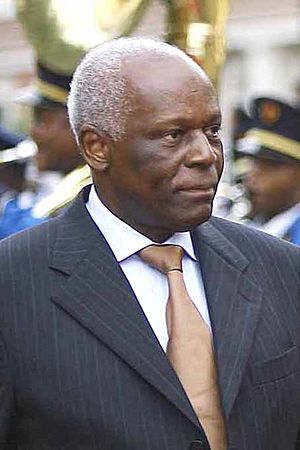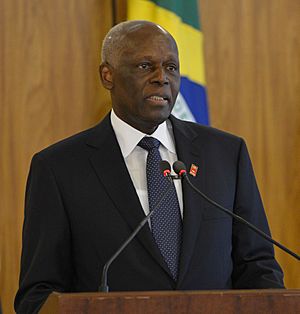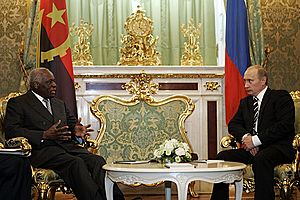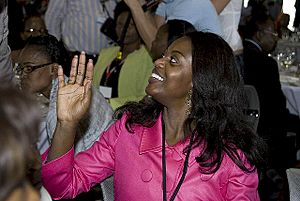José Eduardo dos Santos facts for kids
Quick facts for kids
José Eduardo dos Santos
|
|
|---|---|

dos Santos in 2007
|
|
| 2nd President of Angola | |
| In office 21 September 1979 – 25 September 2017 |
|
| Prime Minister |
|
| Vice President | |
| Preceded by | Lúcio Lara (acting) |
| Succeeded by | João Lourenço |
| Personal details | |
| Born | 28 August 1942 Luanda, Portuguese Angola |
| Died | 8 July 2022 (aged 79) Barcelona, Spain |
| Political party | MPLA |
| Spouses |
|
| Children | 7, including Isabel, José and Coréon Dú |
| Alma mater | Azerbaijan State Oil Academy |
| Signature |  |
| Military service | |
| Rank | Army General (1986) |
José Eduardo dos Santos (born August 28, 1942 – died July 8, 2022) was an important politician from Angola. He was the President of Angola for a very long time, from 1979 to 2017.
As President, he was also the main leader of Angola's army, called the Angolan Armed Forces (FAA). He also led the People's Movement for the Liberation of Angola (MPLA) party. This party has been in charge of Angola since it became independent in 1975. José Eduardo dos Santos was the second-longest serving president in Africa. Only President Teodoro Obiang Nguema Mbasogo of Equatorial Guinea was president for longer.
Dos Santos passed away on July 8, 2022, in a hospital in Barcelona, Spain. He was 79 years old and had been battling cancer.
Contents
Early Life and Education
José Eduardo dos Santos was born in a part of Luanda called Sambizanga. His parents were Avelino Eduardo dos Santos and Jacinta José Paulino. He went to primary school in Luanda. Later, he attended a high school called Liceu Salvador Correia, which is now known as Mutu ya Kevela.
While he was still in school, dos Santos joined the MPLA political party. This was the start of his political journey. In 1961, he had to leave Angola and go to the nearby Congo-Brazzaville. This was because the colonial government was making it hard for people involved in politics. From Congo, he worked with the MPLA and soon became a full member. To continue his studies, he moved to the Soviet Union. By 1969, he had earned degrees in petroleum engineering and radar communications. He studied at the Azerbaijan Oil and Chemistry Institute in Baku, Azerbaijan.
Military Career
In 1970, José Eduardo dos Santos returned to Angola. At that time, Angola was still a territory controlled by Portugal. He spent three years working with the MPLA's EPLA guerrilla fighters. This group later became known as the People's Armed Forces for the Liberation of Angola (FAPLA), which was the MPLA's military branch. He worked as a radio operator in the MPLA's second military region in Cabinda Province.
In 1974, he was promoted to a higher role in the communications service. He also represented the MPLA in different countries like Yugoslavia, Zaire, and China. In September 1974, he was chosen to be part of the MPLA's Central Committee and Politburo in Moxico.
Political Career
In June 1975, dos Santos became the leader of the MPLA's Department of Foreign Affairs. He also helped manage the MPLA's Department of Health. When Angola became independent in November 1975, the MPLA took control in Luanda. However, the new MPLA government faced a civil war. Other political groups, like the National Union for the Total Independence of Angola (UNITA) and the National Liberation Front of Angola (FNLA), were fighting for power.
In 1975, Dos Santos became Angola's first Minister of Foreign Affairs after independence. In this role, he was very important in getting other countries to recognize the MPLA government between 1975 and 1976. At the MPLA's first big meeting in December 1977, Eduardo dos Santos was again chosen for the Central Committee and Politburo. In December 1978, he changed roles from First Deputy Prime Minister to Minister of Planning.
After Angola's first president, Agostinho Neto, passed away on September 10, 1979, José Eduardo dos Santos was chosen as the new president of the MPLA on September 20, 1979. He then became the President of Angola and the Commander-in-Chief of the Armed Forces on September 21. He was also elected as the President of the People's Assembly on November 9, 1980.
Awards and Recognition
- José Eduardo dos Santos was named "Man of the Year 2014" by Africa World magazine. The magazine said he was chosen because of his help in Angola's economic and democratic recovery after the war ended.
- He was praised for his big role in helping Angola gain independence. He also worked hard to bring peace and democracy to the country. He did this by talking with other political groups to finally end the civil war.
- A campus for Engineering and Information Technology at the University of Namibia is named after him. It is called the José Eduardo dos Santos campus. This is because he was a trained engineer and helped Namibia become free from oppression.
Personal Life
José Eduardo dos Santos was married three times and had seven children. In 1991, he married Ana Paula dos Santos, who used to be a fashion model and air hostess.
In mid-2017, dos Santos traveled to Barcelona, Spain, twice for several weeks. People thought these trips were for a medical problem. The government later confirmed that his first visit was indeed for his health. Besides Portuguese, he could also speak Spanish, French, and Russian very well.
Images for kids
-
Dos Santos (fifth from the left) at the Brandenburg Gate during a 1981 state visit, with East German officials
-
George W. Bush hosts Festus Mogae of Botswana, Joaquim Chissano of Mozambique, and José Eduardo dos Santos in 2002
-
Dos Santos in 2003 with the President of Brazil, Lula da Silva
-
President of the United States George W. Bush welcomes President dos Santos to the Oval Office, 2004.
-
President of Brazil Dilma Rousseff meets José Eduardo dos Santos at the Presidential Palace in Luanda, 2011
See also
 In Spanish: José Eduardo dos Santos para niños
In Spanish: José Eduardo dos Santos para niños











